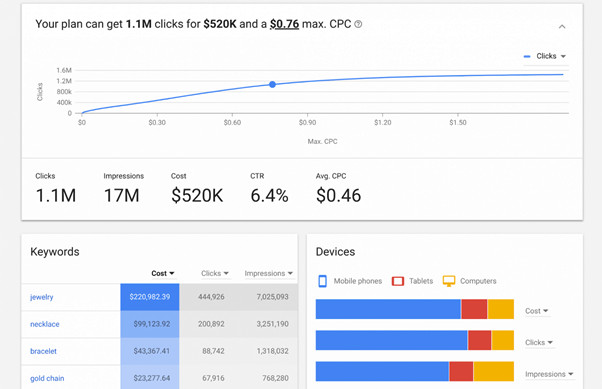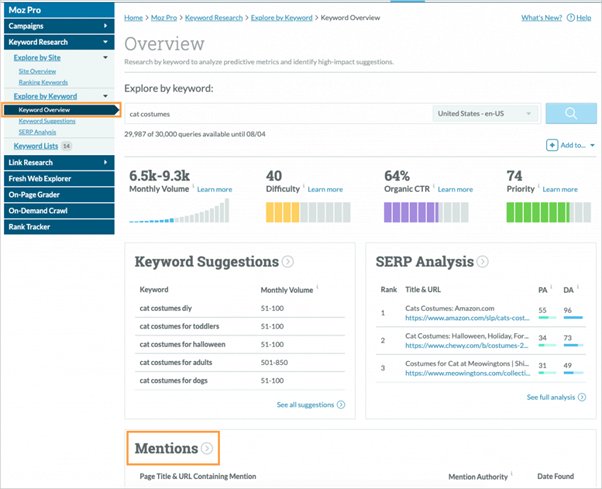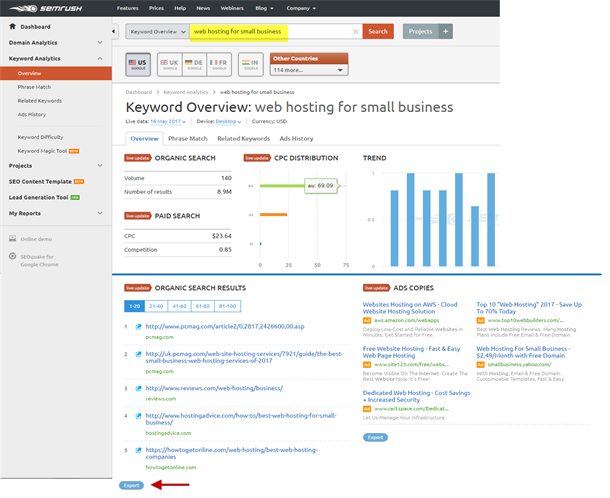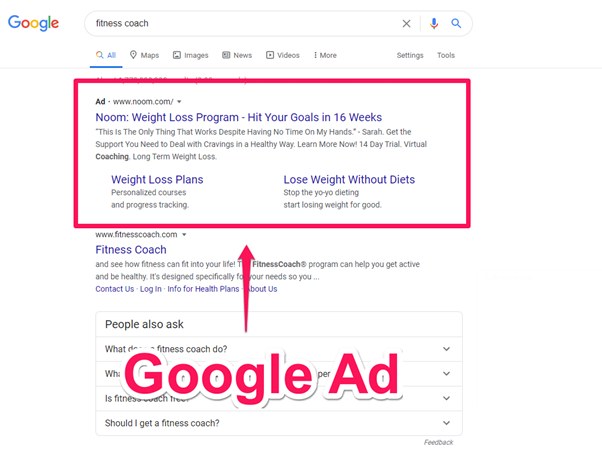SEO Keyword Research
Everything You Need To Know About Keyword Research
As an SEO professional, part of our job is to ensure that your website appears as high up as possible in search engine results pages (SERPs) for relevant queries. And a big part of making that happen is choosing the right keywords to target.
If you want your website to appear on the first page of a search engine, it is crucial to use relevant keywords throughout your site. But how do you determine which keywords are right for your business? That’s where keyword research comes in.
In this blog post, we’ll take a look at some of the tools and techniques you can use to do keyword research. There are a number of different methods that you can use. The most important thing is to choose a method that works best for you and your business. So let’s get started.
What is keyword ?
A keyword, in the context of search engine optimization, is a particular word or phrase that describes the contents of a web page. Keywords are used by search engines to index and categorize web pages for relevant searches.
The use of keywords is important because it allows search engines to match a user’s search query with the most relevant web pages. If a web page is properly optimized for a particular keyword, it has a better chance of appearing in the top results of a search engine.
What is keyword research ?
At its most basic, keyword research is the process of identifying which terms people are using to search for the products, services, or information that you offer. But it’s not quite as simple as just finding out what words people are using.
You also need to consider factors like how many people are searching for a particular term, how difficult it will be to rank for that term, and whether or not the searchers are actually looking to buy what you’re selling.
Why is keyword research important and its role in SEO ?
Keyword research is important because it helps you understand what people are actually searching for online. It’s not enough to just guess what keywords might be relevant to your business.
You need to know for sure which keywords are being used by potential customers so that you can optimize your website accordingly.
If you don’t do keyword research, you run the risk of optimizing your website for keywords that nobody is actually searching for. This wastes your time and effort and can also hurt your business by making your site less relevant to searchers.
Keyword research is essential for any effective SEO campaign and is one of the most important aspects of SEO. By identifying the right keywords to target, you can focus your efforts on the most profitable areas, and improve your chances of ranking high in search engine results pages.
Different types of keywords
- Exact Match Keyword (the main keyword)
- Long-Tail Keyword
- LSI Keyword (related keyword)
- Branded keyword
- Competitor keyword
- Short-tail keywords / Generic Keywords
- Phrase match keyword
- Informational keyword
- Transactional keyword
1. Exact Match Keywords
The exact match or main keywords are the words or phrases that you want your website to rank for in search engine results pages. They are the terms that you want to be associated with your business and should be included in your website’s content and metadata. For example; “baseball bats”
2. Long-tail Keywords
Long-tail keywords are specific phrases that are more targeted than general keywords. They are more likely to convert into customers, as they are more relevant to the searcher’s needs. For example; “Best baseball bats for kids below 10”
A longtail keyword is a keyword phrase that is very specific and targeted. Longtail keywords are usually 4 or more words in length. They are often used by businesses to target niche markets or specific product searches. For example, “Best Mizuno baseball bats for kids below 10”
3. LSI or Related Keywords
Latent Semantic Indexing (LSI) keywords are words and phrases that are related to your main keywords. They can be used to generate additional traffic to your website and can also be included in your content and metadata.
LSI keywords can be found using certain tools but these are also the phrases that appear as a drop-down list when you search for something at Google.
For example; when you type baseball bats in the search bar, it will show you a list of related searches by other users.
- baseball bats for sale
- baseball bats near me
- baseball bats for kids

4. Branded keywords
Branded keywords are the keywords or phrases that are associated with your brand or business. They can be used to generate traffic and leads to your website. Like exact match keywords, branded keywords should also be included in your website’s content and metadata. For example, “Mizuno baseball bats”.
5. Competitor keywords
Competitor keywords are the keywords or phrases that your competitors are targeting in their SEO campaigns. They can be used to identify new keyword ideas and benchmark your own SEO progress against your competitors.
6. Short-tail Generic Keywords
Short-tail keywords are general, high-traffic keywords that are less specific than long-tail keywords. They can be used to generate traffic to your website but may not be as relevant to the searcher’s needs as long-tail keywords. For example; “shoes”, “clothes”

7. Phrase match keywords
Phrase match keywords are keywords or phrases that contain your target main keyword, but may also include other words before or after it.
This type of keyword targeting allows you to capture traffic from searches that include your main keyword as well as those that include related terms. For example, “baseball bats for sale” would be a phrase match for the main keyword “baseball bats”.
By targeting phrase-match keywords, you can reach more potential customers who are interested in your products or services.
8. Informational keywords
Informational keywords are the keywords or phrases that people use when they are looking for information about a particular topic. They can be used to generate traffic and leads to your website.
For example, if you own a shoe store, you would want to target informational keywords like “what to look for when choosing shoes for kids”, “how to measure shoe size”, etc. These keywords will attract people who are looking for information about shoes, which could lead to them visiting your store’s website.
9. Transactional keywords
Transactional keywords are those that are associated with actions that people take, such as buying or selling products and services. They can be used to generate traffic and leads to your website.
For example “buy baseball bats” or “buy shoes online”would be a transactional keyword.
Include transactional keywords on your website’s content and metadata to attract potential customers who are ready to buy.
Popular Keyword Research Tools
It’s important to invest time in researching the right keywords for your SEO campaigns. This is when you discover words and phrases that potential customers might use when they are looking online for something related to what you are selling.
If you want to find the right keywords for your SEO campaigns, know that there are a plethora of tools at your disposal. Some come with a price tag while others don’t. Here, we’ll explore some of the most commonly used ones and see which category they fall under.
1. Google AdWords Keyword Planner – Free Tool
Google’s AdWords Keyword Planner is one of the most popular tools for doing keyword research. It allows you to find keywords related to your business, and your upcoming campaigns and see how much traffic those keywords generate.
You can also use the AdWords Keyword Planner to find out how competitive a keyword is and see other related keywords.
Simply enter a keyword into the tool, and Google will return a list of related keywords, along with data on average monthly searches and competition level. It also provides data on average monthly search volume and suggested bid prices.
This is a great way to get started with your keyword research and narrow down your options. It is completely free and can be accessed here: https://adwords.google.com/KeywordPlanner

2. Google Trends – Free Tool
Google Trends is another free tool from Google that allows you to see how popular a particular keyword is over time. You can use this tool to identify new or trending keywords that you may be interested in targeting in your SEO campaigns.
You can access Google Trends here: https://trends.google.com/trends
3. Moz Keyword Explorer – Free Tool
This tool provides detailed data on keyword difficulty, search volume, and potential organic click-through rate. It also offers suggestions for related keywords.
The SERP Features Tool from Moz in Keyword Explorer allows you to see which SERP features are associated with a particular keyword. It can be useful for identifying potential opportunities for your SEO campaigns, such as featured snippets, answer boxes, and carousels.
The SERP Features Tool is free to use and can be accessed here: https://moz.com/tools/SERP-features

4. KeywordTool.io – Free Tool
KeywordTool.io is another free tool that’s great for generating long-tail keywords. Enter the main keyword into the tool, and it will return a list of related keywords, along with data on monthly searches and competition levels. You can even filter the results by country and language!
5. SEMrush – Paid Tool
SEMrush is a paid tool that offers a comprehensive suite of SEO features, including keyword research capabilities.
With SEMrush, you can see not only data on monthly searches and competition level but also information on related keywords, SERP features, search volume, CPC, and more. If you’re serious about SEO, SEMrush is definitely worth checking out.

6. Ahrefs Keywords Explorer – Paid Tool
Ahrefs Keywords Explorer is a paid tool that helps you identify the right keywords for your business. It provides data on monthly searches, search volume, keyword difficulty, organic CTR, and competition level, as well as related keywords and SERP features.
This tool can be helpful for identifying potential opportunities for your SEO campaigns.

7. KWFinder – Paid Tool
KWFinder is a great tool for finding keywords that have low competition and high search volume. It also offers data on keyword difficulty, so you can be sure that a particular keyword is worth targeting.
It provides data on search volume, CPC, PPC, traffic levels, SEO difficulty, and more. KWFinder is a paid tool, but the price is definitely worth it if you’re serious about SEO.
Tips on how to do SEO keyword research
Now that we’ve gone over some of the common research tools for keywords, let’s talk about some tips and tricks that will help you get the most out of your research.
1. Start Broad Walk Narrow:
One tip is to start broad and then narrow down your focus. For example, if you sell shoes, you may want to start by researching general terms like “shoes” or “footwear.” Once you’ve done that, you can then begin to narrow down your focus by researching more specific terms like “women’s shoes” or “running shoes.”
- Use Google Suggest:
One way to find good keywords is to use Google Suggest. Type a keyword into Google and see what suggestions Google gives you. These suggestions are based on what other people have searched for in the past, so they can be quite helpful.
- Look at Google AdWords Ads:
Another place you can look for good keywords is in Google AdWords ads. Simply do a search for your main keyword and see what ad text appears. These are usually pretty good indicators of what people are searching for.

2. Think Like Your Customer/User:
Another tip is to think like your customer. What words or phrases would they use when searching for your product or service? For example, if you sell men’s suits, potential customers might search for terms like “men’s clothing,” “men’s formalwear,” or “suits for men.”
By thinking like your customer, you can come up with a list of potential keywords that they are likely to use when searching for your product or service.
- Use social media:
Social media can also be a great place to do keyword research. Start by looking at hashtags related to your desired keyword. You can also look at the descriptions of popular posts in your niche.
- Use Amazon:
Amazon is another great place for keyword research, especially if you’re in the eCommerce space. Start by searching for products related to your seed keyword.
Then, take a look at the product descriptions and reviews to see what words people are using when talking about these products.

- Use Forums:
Forums can be great places to find out what people are talking about in your niche. Do a search for forums related to your niche, then take a look at popular threads within those forums. You can also try doing searches on Reddit or Quora.
- Ask Your Customers:
Another great way to find out what keywords you should be targeting is simply to ask your customers! You can do this via surveys, customer interviews, or even just casual conversations.
- Use Google Trends:
Finally, don’t forget about Google Trends! This is a free tool from Google that allows you to see how popular certain topics and keywords have been over time. This can be helpful in understanding seasonal trends as well as overall popularity over time.
3. Be On A Look Out For Competitors:
Finally, don’t forget to keep an eye on your competition. By tracking your competition’s keyword campaigns, you can get an idea of which keywords are working well for them and which ones aren’t. You can then use this information to adjust your own keyword strategy so that you can stay one step ahead of them.
- Look at competitors’ websites and search engine rankings:
One way to find good keywords to target is to look at your competitors’ websites and see what words they are targeting. You can also use a tool like Moz’s Open Site Explorer or Ahref’s Site Explorer to check their backlink profiles and see what words they are targeting with their link-building efforts.
How To Select The Right Keywords For SEO
1. Check the Monthly Search Volume:
First, you’ll want to check the monthly search volume for the keyword. This will give you a general idea of how many people are searching for that particular keyword each month.
2. Research the Competition:
Next, you’ll want to research the competition for that keyword. You can do this by looking at how many websites are ranking in Google’s top 10 results for that keyword. If there are too many competitors, then it might be difficult to rank well for that keyword.
3. Check the Keyword Difficulty Score:
Another thing you’ll want to look at is the keyword difficulty score. This will tell you how difficult it will be to rank well for that particular keyword. The higher the score, the more difficult it will be to rank in Google’s top 10 results.
4. Consider Long-Tail Variations:
Finally, you may also want to consider targeting long-tail variations of your main keyword instead of targeting the main keyword itself. This can be a more effective strategy, especially if the main keyword is too competitive or has a high monthly search volume
Here is a video to help you:
Conclusion:
If you’re still reading, this means that now you are well aware of the importance and how to start with your keyword research for your SEO journey. It may sound daunting, but it is not that hard as well. You have to give it some time.
Keyword research is an essential part of any SEO campaign. If you utilize the proper keyword tools and follow these tips, you will find a list of keywords that will work well for your business. Targeting the right keywords will help drive more traffic and potential customers to your website.
Now that you understand the basics of keyword research, it’s time to put this knowledge into action. If you’re feeling overwhelmed and need help implementing these concepts, our SEO consultant is here to assist you.
We have years of experience in helping businesses just like yours achieve their desired results through effective SEO campaigns. Contact us today for a free consultation and let us show you how we can help increase your website traffic and boost your product sales with the power of keywords.
